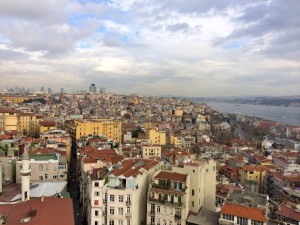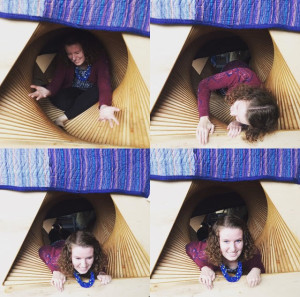
Istanbul is one of those places that weaves its way through my everyday existence and forever will.
The lamp created an opaque mosaic of little morsels, candy molding into one big window display. I gravitated to the glass. “It’s called ‘lokum,’” he said. I had probably heard of it as “Turkish delight.” That experience in Turkey got me addicted to awe. It got me addicted to a lot of feelings. Awe, wonder, (healthy) rebellion. The pretty feelings gave way to ugly feelings, feelings I craved for too long after the real-life experiences morphed into wall decor.
Along the way, each new feeling came with its own lingering, nagging foe, peppered with wanderlust and an insatiable craving for Turkish tea.
In the English-speaking world, language emboldens me, providing power, glimpses of authority even, my non-threatening physical presence irrelevant, replaced by booming words. In the Turkish-speaking world, language provided me a glimpse of perpetual uncertainty, of recklessness and rebellion in all their unkempt glory.
On the final day of the trip, I walked back from the Grand Bazaar in Istanbul to my hotel, probably 10-15 minutes away, following only familiar landmarks. The hazy aura and pungent smell of hashish on that corner. The windows of wedding dresses, some white like Americans wear, others bright, satiny colors like a Prom dress, per Turkish tradition.
When I walk in the U.S., I find my gaze unconsciously falling to the concrete below; I already know where I’m going. There, I walked with my head up the whole time, emboldened, oddly, by the rebellion and innate recklessness. By the fact that I couldn’t communicate — the thing that foremost defines me in professional and personal capacities.
I didn’t tell my professor or anyone I would split from my group in the Grand Bazaar. That I would walk alone in Istanbul for several blocks both ways. That I was meeting the charming Turkish translator I had met 13 days before. My own language, for the first time, felt insufficient to express any, let alone all, of the above. As I walked, I mumbled, trying to pronounce each of the street signs, thrilled by my own inability. My own intoxicating, dizzying inability.
In the spirit of cyclical, well, everything, that intoxicating, dizzying inability helped me heal, finally, nearly eight months later. Revenge, for me, is often rooted in language. Sometimes, it is the silent rehearsal of what Teenage Taylor would have said to her then-so-called “soulmate” if she ever got the chance. For the record, I typically realize halfway through this ritual that what I’m plotting is not comprised of my own words but lyrics from a Taylor Swift song. He had told me he wanted to learn Arabic; as my own personal form of revenge, I decided I would take it my final semester of college and be better at it.
There’s something deeply empowering, I learned, about accepting my own naiveté, about remembering never to take myself too seriously. I found all of the above in Arabic class: jumbled sounds that still aren’t embedded in my native-English-speaker brain, the reality of taking three solid minutes to write, “Hi, my name is Taylor,” the time I accidentally spent an entire week mixing up the words for “male friend” and “boyfriend” (a key distinction, I assure you).
It wasn’t a product of external signage swirling together like in Turkey; with practice, the Arabic swirling stopped. I made slow sense of this otherworldly alphabet with squiggles and swoops and dots all its own. Its beautiful, mesmerizing, difficult own. In reclaiming language through language, I reclaimed an experience I couldn’t write about it for nearly a year-and-a-half, doubting not only the validity of my own expression but also the validity of my own existence.
A few months ago while reading Leslie Jamison’s The Empathy Exams, I arrived at a sentence that captured the whole wreck in seven words: “I write about it because it happened.” Reclaiming and validating one’s existence is a terrifying thing, and Jamison achieved it in that single thought. The present-to-past-tense shift soothes my soul in a way Turkish tea never could. I write about it here, now, at my kitchen counter in my big-girl apartment, one that’s decorated with the remnants of my experience. Acknowledgement of that coexistence is what I had craved all along; I could be wrecked, challenged, changed, all because it happened. I could be wrecked when I wrote about it and when I write about in the future. It was OK to be wrecked.
I write to survive, I’ve long said when I explain the compulsion to journal and blog. The time my need to write transformed the Des Moines skywalk system into an obstacle course as I practically walked into windows, walls, people as I furiously tapped typo-riddled notes into my iPhone on the way to work. The words beyond my touchscreen blurred, making no more sense than the unintelligible Turkish that had before lined the cobblestone streets as landmarks guided me. I was months and miles removed from that experience until the eerie parallel emerged in familiar territory, drawing me to the idea that familiarity is, perhaps, a figment, something that deprives me of the potential to derive new worth from the past. I write about it because it happened.
 Last Saturday I saw “Crazy Rich Asians” by myself here in Iowa City. I had forgotten how heavy the silence is in law school, the way hours and hours of quiet reading sink into your soul. The sensory overload of going to a movie — the screen, the speakers, the inescapability of it all — comforts me, as if it’s possible to refill the silence, to pour sound and light and feeling right back into my emotionally drained spirit.
Last Saturday I saw “Crazy Rich Asians” by myself here in Iowa City. I had forgotten how heavy the silence is in law school, the way hours and hours of quiet reading sink into your soul. The sensory overload of going to a movie — the screen, the speakers, the inescapability of it all — comforts me, as if it’s possible to refill the silence, to pour sound and light and feeling right back into my emotionally drained spirit.





